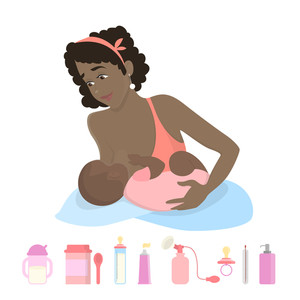In my line of work I’ve come across a lot in terms of breastfeeding. I’ve heard a mum say that breastfeeding is all hype and nothing, she goes on to further say that formula is completely the same, maybe even better than breastmilk

[Benefits of breastfeeding to mum and baby]
I am here to correct this notion providing evidence based knowledge on why breastfeeding is good for babies.
Human milk is the perfect milk that can provide nourishing nutrients for human babies. Breastmilk is packed with specific components that your baby needs at every stage of development. These components also change based on different scenarios such as between feeds, time of the day, age of baby, health of baby etc. Breastmilk is basically the perfect cocktail for your baby at any time.[Tweet “Breastmilk is basically the perfect cocktail for your baby at any time.”]
During pregnancy your body goes through a lot of physiological changes, from first trimester all the way to the last trimester. One of those changes is breast glandular development in preparation of breastfeeding. Your breast starts to grow bigger, might be tender, your nipple changes, the dark area around your nipple gets darker etc. This is mother nature doing its part. From mid-pregnancy your body starts producing breastmilk (Colostrum) and will continue until your baby is born. Some mothers are able to see their colostrum during pregnancy but a whole lot of mothers do not experience this. This has no effect on how your milk supply will be. So don’t feel bad or panic over this.
After giving birth to your baby and delivering the placenta, your body undergoes hormonal changes and can now start releasing colostrum for the first milk.

[Benefits of breastfeeding to mum and baby]
Below are a few nutritious components in breastmilk
Colustrum
Colostrum, which is also known as liquid gold is usually small in volume but very powerful. Each drop contains everything your baby’s new organs require, It’s the first vaccine for your baby, protecting the lining of the gut and providing defense against pathogens like bacteria, virus etc that would want to take advantage of your baby’s low immunity. This colostrum changes to transitional milk and by two weeks become fully mature milk.
Breastmilk contains the perfect combination of protein. At the newborn period, breastmilk contains 90% of whey protein and 10% of casein protein and this changes to 60% and 40% respectively afterwards. Whey protein is easy on the bowel of a newborn so its easily digested providing constant nutrient to baby. Formula has more casein to whey ratio. The importance of whey protein lies on its immunological defense components which include Lactoferrin, Alpha-lactalbumin, Serum albumin, Immunoglobulins and Lysozyme. These components help your newborn to fight a host of immune defense giving your newborn a 90% chance at survival.
Lactose
Lactose is the main carbohydrate found in breastmilk. This provides 40% of the calories required for your baby daily nutrition. It also provides energy to the brain and promote growth of lactobacillus which is a probiotic, thereby reducing a large number of unhealthy bacteria in the stomach. It helps to fight disease and promotes the growth of healthy bacteria in the stomach.
Fat in breastmilk
Fat in breastmilk provides about half of the calories for your baby’s daily needs. It’s responsible for brain development, the higher visual acuity and cognitive ability of a child and promotes a healthy neurological growth.
Breastmilk contains fat soluble and water soluble vitamins.
Vitamin A is necessary for vision development, Vitamin D which is for bone growth is available, but in little amount, so baby needs additional daily intake, Vitamin E is an antioxidant, protecting the cells from injury, Vitamin K is required for blood clotting factors preventing bleeding.
Minerals in breastmilk include sodium, zinc, Iron (this is present in small amount but baby has built a reserve from the womb), calcium, magnesium, and more

[10 tips for naturally increasing breast milk supply]
Others include;
- Breastmilk has living microorganisms that has a great health benefit. They colonize the oral cavity of breastfed babies more frequently than formula fed babies.
- Breastmilk contains white blood cells, living cells that respond to infection by attacking and killing the foreign cells and bacteria.
- Antibodies and immunoglobulins are found in breastmilk and provide important immunological protection for your baby especially at the gut which is one of the first line of defense.
- Breastmilk contains 88% water and this is more than enough water for your baby. The milk at the beginning of feeds has more water and helps quench thirst in babies.
There is REALLY a lot in breastmilk. I tried counting the components myself and I counted over 200 and still counting. More than half of it cannot be manufactured.
So in summary breastmilk contains water, carbohydrate, protein, nonprotein nitrogens, amino acids, nucleotides, antimicrobial factors, enzymes, hormones, peptides, cytokines, vitamins, minerals, sterol, sphingolipids, phospholipids, triglycerides, etc.…. These all have a lot of components under them.
So if you are still thinking whether to breastfeed or not. I will strongly recommend you do.
Contributed by Chibueze Obinwanne


